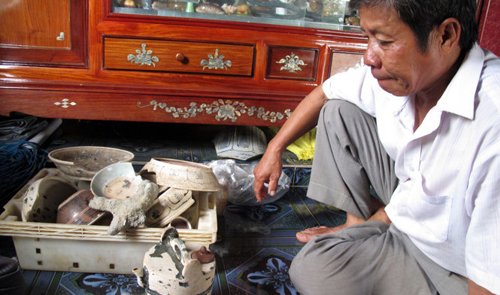The disappearance of antiques in Vietnam is worsened when thieves target objects displayed in royal palaces in the central city of Hue, and in pagodas across the nation.
These sites have lacked appropriate protection.
In most thefts, burglars disguise themselves as tourists and hide inside the buildings until late at night, when they spring into action.
Numerous antiques, including precious national objects in Hue, have disappeared in this way.
The trial of Nguyen Tien Khanh, 39, two years ago for stealing antiques from royal citadels in Hue was a rare case in which a thief was caught. At the court, Khanh admitted that he had already stolen objects eight times within a year without being detected.
Some objects are worth several billion dong (VND1 billion ~ US$47,000) each, such as lion-shaped ornamental jars or ceramic discs and bowls made hundreds of years ago.
At the Hoa Khiem Palace of the royal tomb of King Tu Duc, who reigned in the 19th century, hundreds of rare antique items are on display.
An antique dealer admitted that each of the items in the palace is worth billions of dong.
However, they are only protected by a glass window.
Several guards are supposed to watch an area of hundreds of square meters in the palace. In the afternoon, the guards are mostly absent.
This is similar to most royal palaces in Hue. A survey shows that the former capital city of Vietnam now has 29 relic palaces holding around 13,000 antique items.
The Hue Royal Museum is the only place in the city that is equipped with a camera network to protect the antiques.
All 29 sites have a total of 162 guards, or six guards per site on average.
Phan Thanh Hai, director of the Hue Royal Museum, said he has suggested installing a security camera network, but the idea has been rejected over the cost.
Besides royal palaces, pagodas across the nation also store a large number of antiques, mainly bronze and ceramic statues of Buddhas and saints. Many of them were produced centuries ago.
Monks have to protect the antiques by removing them from altars and showcases and placing them in locked, secret cabinets in the pagodas.
As a result, the monks endure allegations from their neighbors of ‘embezzlement’ to protect the invaluable antiques.
According to current Vietnamese law, all antique items found under the ground or underwater are owned by the government. However, there is no regulation regarding who gets credit when someone happens to discover and excavate them.
People often excavate the objects secretly so that they can keep them.
Consequently, century-old cannons found in rivers where sea battles occurred are often cut into pieces for scrap iron.
Dr. Nguyen Viet, director of the Southeast Asia Prehistory Center in Hanoi, believes that those who dig up or buy antiques are responsible for protecting them.
However, the government does not agree with this view, as buyers are charged with the illegal sale of antiques under current laws.
If antique items are sold abroad to nations that have legalized the purchase of antiques, Vietnamese authorities have no base to say they are the legal owner of the sold items.
Experts have said that one way to protect ancient items is by publicizing them.
A genuine owner of an item can ‘mark’ their ownership by posting the images, characteristics and descriptions of the items on the Internet, they suggested.






















































